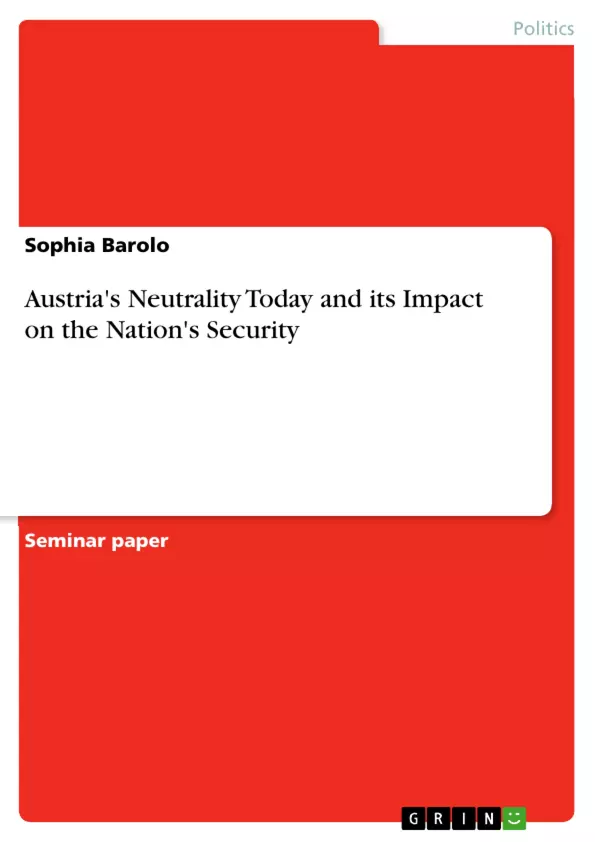In my paper, I want to investigate to which extent Austrian neutrality is still existing. Is it yet more than a romantic picture of our home country? How has this concept been affected by the membership in various International Organizations, especially the EU? And how does a neutral state cope with its security in a globalized world? My hypotheses are that in the course of time, Austria has quietly given up neutrality in favor of the benefits of being part of the international community. Security Policies are coordinated and in a globalized world, that is continuously moving closer together, cannot work independently. Therefore Austria has to participate and cannot hide behind it’s neutrality.
Table of Contents
- A. Executive Summary
- 1. Introduction
- 2. Neutrality
- 2.1. Definition and Historic Overview
- 2.2. Permanent Neutrality in Austria
- 3. Austria in relation to International Organizations
- 3.1. Austria in the EU
- 3.2. Austria in the UN
- 3.3. Austria and NATO
- 3.4. EU and NATO
- 4. Austria's Security Strategy
- 5. Résumé
- 6. Bibliography
Objectives and Key Themes
This paper aims to investigate the continued existence of Austrian neutrality, its impact on the nation's security in a globalized world, and how its membership in various international organizations, particularly the EU, has influenced this concept.
- The evolving nature of Austrian neutrality since its declaration in 1955
- The interplay between Austria's neutrality and its participation in international organizations, particularly the EU and NATO
- The challenges and opportunities presented by a neutral state in a globalized world
- The impact of Austria's neutrality on its national security
- The potential advantages and disadvantages of maintaining neutrality in the context of contemporary international relations
Chapter Summaries
The paper starts with an introduction, exploring the historical context of Austrian neutrality and its significance to national identity. It then delves into the concept of neutrality itself, defining various types and providing a historical overview. The paper specifically examines permanent neutrality, tracing its roots and its application in Austria's case. The next chapter analyzes Austria's relationships with various international organizations, focusing on its membership in the EU, UN, and its interactions with NATO. This chapter explores the complexities of Austria's neutral status within the context of these international organizations, particularly considering the close cooperation between the EU and NATO. The paper concludes with a chapter on Austria's security strategy, highlighting the balancing act between neutrality and security in a globalized world.
Keywords
Austrian neutrality, international organizations, European Union, North Atlantic Treaty Organization (NATO), security policy, globalized world, national identity, international law, permanent neutrality, historical overview, international treaties, peace-keeping operations, strategic partnerships, Berlin Plus Agreement, Partnership for Peace (PfP) program.
Frequently Asked Questions
Is Austria still a neutral state today?
While Austria maintains its status of "permanent neutrality" declared in 1955, its participation in international organizations like the EU has modified how this concept is practiced.
How does EU membership affect Austrian neutrality?
As an EU member, Austria participates in common security policies and international community benefits, which sometimes requires coordinating security strategies beyond independent neutrality.
Does Austria cooperate with NATO?
Yes, Austria interacts with NATO through programs like the Partnership for Peace (PfP) and agreements like the Berlin Plus Agreement, despite not being a full member.
What are the challenges for a neutral state in a globalized world?
In a globalized world, security threats are interconnected; therefore, a neutral state cannot hide behind neutrality and must participate in collective security strategies.
What is Austria's current security strategy?
Austria's strategy involves a balancing act between maintaining its neutral identity and engaging in strategic partnerships and peace-keeping operations to ensure national security.
- Quote paper
- Sophia Barolo (Author), 2016, Austria's Neutrality Today and its Impact on the Nation's Security, Munich, GRIN Verlag, https://www.grin.com/document/371336



